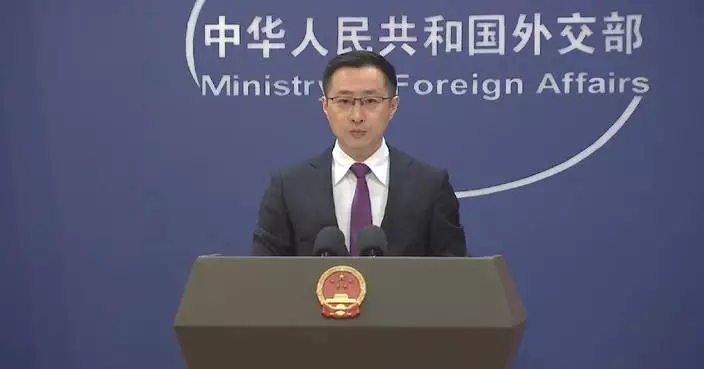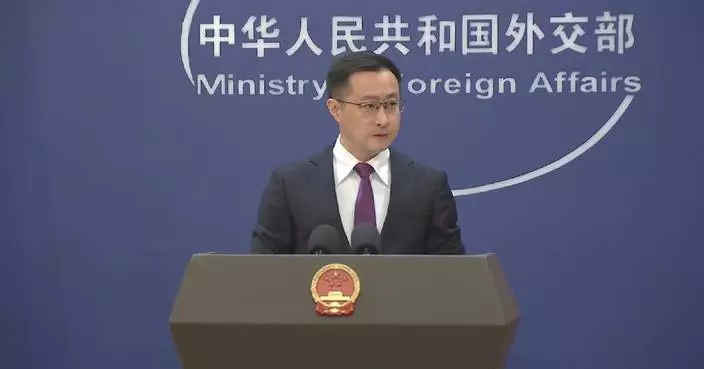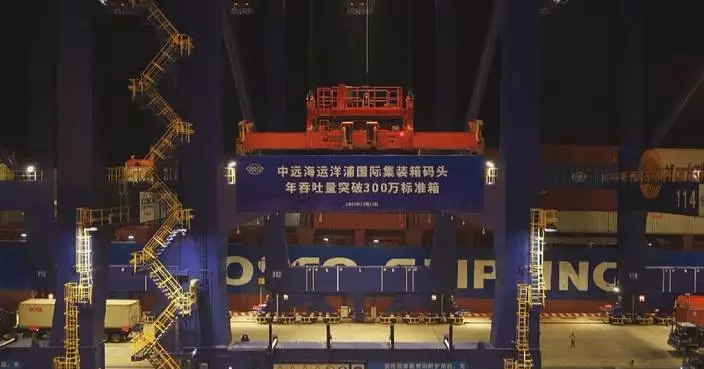Feature · News

White House rebuffs Catholic bishops' appeal for a Christmas pause in immigration enforcement

Digital technology helps Chinese online literature captivate global readers

New plan launched to expedite clearance, licensing for NEVs in Hong Kong

Thai villagers caught up in border clash take up night patrols to alert community against attacks

China's first city-level scenario-based public service platform starts operation in Nanjing
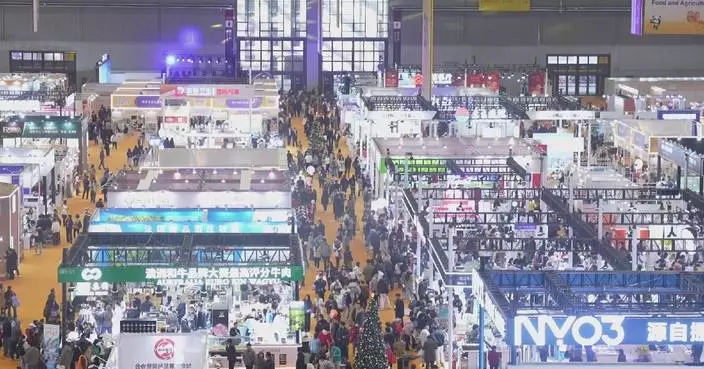
CIIE-linked fair brings global goods directly to Chinese consumers

Beijing-Tianjin-Hebei region advances coordinated development in building int'l tech innovation hub
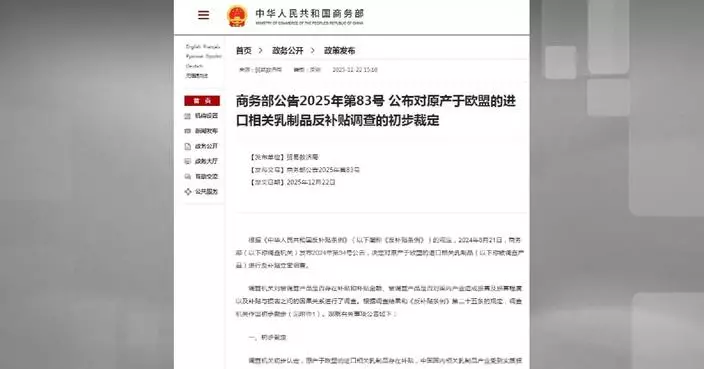
China imposes temporary anti-subsidy measures on EU dairy imports

Russia captures one more settlement in Kharkiv, Ukraine reports power outages from Russian attacks

Japan's Largest Anime Specialty Store Lands in Hong Kong - Animate Hong Kong's Mong Kok Direct Store Officially Opens Today

Mercedes-Benz agrees to pay $149.6 million to settle multistate emissions allegations

Waymos blocked roads and caused chaos during San Francisco power outage

Colorado immigration activist Jeanette Vizguerra released from detention, advocates say

A car crashes into a bus stop in Germany and injures 3 people
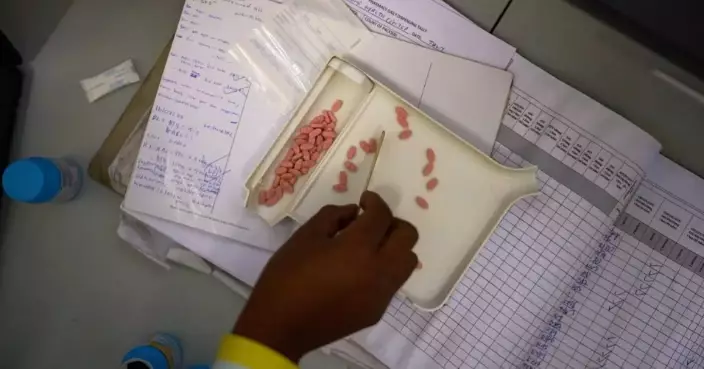
US signs new health deals with 9 African countries that mirror Trump's priorities

HK's West Kowloon Station sees annual passenger flow exceed 30 million
Beijing-Tianjin-Hebei region advances coordinated development in building int'l tech innovation hub
China imposes temporary anti-subsidy measures on EU dairy imports
Russia captures one more settlement in Kharkiv, Ukraine reports power outages from Russian attacks

Japan's Largest Anime Specialty Store Lands in Hong Kong - Animate Hong Kong's Mong Kok Direct Store Officially Opens Today

White House rebuffs Catholic bishops' appeal for a Christmas pause in immigration enforcement
Digital technology helps Chinese online literature captivate global readers
New plan launched to expedite clearance, licensing for NEVs in Hong Kong
Thai villagers caught up in border clash take up night patrols to alert community against attacks
China's first city-level scenario-based public service platform starts operation in Nanjing
CIIE-linked fair brings global goods directly to Chinese consumers

Mercedes-Benz agrees to pay $149.6 million to settle multistate emissions allegations

Waymos blocked roads and caused chaos during San Francisco power outage

Colorado immigration activist Jeanette Vizguerra released from detention, advocates say

A car crashes into a bus stop in Germany and injures 3 people

US signs new health deals with 9 African countries that mirror Trump's priorities
HK's West Kowloon Station sees annual passenger flow exceed 30 million
Feature·Bloggers

How Jimmy Lai's Right-Hand Man Ran a Corporate Shakedown Operation

【Deep Blue】Trump's "Empire Strikes Back" Gambit: A Long Shot at Best

【What Say You?】Unfinished business With the “anti-Hong Kong triangle”?

【Bastille Commentary】UK's Hypocrisy on Display: Seizing Private Assets While Preaching Freedom

【What Say You?】London’s Selective Memory on National Security

【What Say You?】The “Shina-Implosion” Playbook Behind Jimmy Lai

Nigerians welcome 130 schoolchildren and teachers released after mass abduction
- South Korea lawmakers pass bill to establish rebellion courts after complaints about Yoon case
- Japan's former emperor turns 92 as heart condition stabilizes after health concerns
- At least 5 killed after Mexican Navy plane on medical mission crashes in Texas
- From hula hoops to hearing aids: Oldest baby boomers turn 80 in 2026, contributing to an aging US
- Betty Reid Soskin, oldest National Park Service ranger, dies at 104
- Thailand and Cambodia to resume ceasefire talks after deadly border clashes
- US strikes another alleged drug-smuggling boat in eastern Pacific
- Vince Zampella, video game pioneer behind Call of Duty, dies at 55
- Trump warns Maduro against playing 'tough' as US escalates pressure campaign on Venezuela

Maduro condemns U.S. piracy actions in letter to UN
- Arctic security remains key priority for EU: European Commission President
- Heavy snow sweeps northern China
- China's key regions post noticeable foreign trade growth from January to November
- First flight of international tourists arrive in Hainan under seventh-freedom traffic right
- 2026 Spring Festival Gala mascots displayed on outdoor screens across China
- EU extends economic sanctions on Russia for another 6 months
- Russian, Venezuelan FMs voice concern over US actions in Caribbean
- China's top legislature convenes standing committee session
- China hopes ROK will handle submarine cooperation with U.S. with prudence: spokesman

HTX Ventures Explores x402 and ERC-8004 in New Report, Signaling Web3's Next Technical Inflection Point
- MyRepublic Launches Card Sub, Singapore’s First Subscription Service for Trading Card Game Fans
- HARMAN to Acquire ZF’s ADAS Business
- Swedish Businesses Shift from AI Curiosity to Action, Says Dstny Sweden
- allnex wins EU Product Safety Award for PFAS-Free additives
- Shanghai launches Fuxing Island as global maker hub
- Shanghai-based MNCs step up ESG innovation
- Rao Tummala and Industry Leaders from ASE, TSMC, Intel, Toyota, and Honda to Speak at NEPCON JAPAN's 40th Anniversary
- HTX Trading Championship Concludes, Attracting Over 90,000 Participants and Distributing 1,000,000 USDT in Rewards
- Bracell Wins 2025 Amcham Eco Award for Pioneering One-for-One Environmental Conservation Initiative

What's an atmospheric river? AP explains the weather phenomenon
- Starlink in the crosshairs: How Russia could attack Elon Musk's conquering of space
- Japan's new flagship H3 rocket fails to put geolocation satellite into orbit
- The rise of deepfake cyberbullying poses a growing problem for schools
- Boys at her school shared AI-generated, nude images of her. After a fight, she was the one expelled
- These influencers are teaching Christianity online — and young people are listening
- Doctor's orders? ‘Belly laugh at least two to five days a week'
- PHOTO ESSAY: Invisible infrared surveillance technology and those caught in its digital cage
- How surveillance technology and the 'Reddit Detective Agency' helped search for a killer
- You finally got a doctor's appointment. Here's how to get the most out of it

Swanson TV dinners and Tang: How well do you know baby boomer pop culture?
- Barry Manilow has early-stage lung cancer and will undergo surgery
- Dried cherry scones are a simple treat for the post-holiday breakfast table
- Banksy unveils new art in London following speculation over murals depicting stargazing figures
- Golden Gate Park's dazzling holiday light display brings joy to the season
- Larry Ellison guarantees $40.4 billion in Paramount's hostile bid for Warner Bros. Discovery
- Singer-songwriter Chris Rea, known for 'Driving Home for Christmas,' dies at 74
- Pop culture in 2025: A ring for Taylor, an ill-timed KissCam ... and whatever ‘6-7’ means
- The Grammys split the country album category into traditional and contemporary. It might be great
- Turkey shoot a holiday tradition, with no ruffled feathers

Team official to investigate drinking habits of England cricketers during Ashes tour
- Draymond Green, Steve Kerr have heated exchange in huddle during timeout before Green leaves court
- Duren scores 26 and Pistons beat Trail Blazers 110-102 after blowing 21-point lead
- Jordan Eberle scores 2 in 3rd period as Kraken beat Ducks 3-1
- Philip Rivers starts strong, but his late Pick-6 proves costly to Colts' playoff hopes in 48-27 loss
- Mason Marchment scores 2 power-play goals, Kirill Marchenko adds 1 as Blue Jackets beat Kings 3-1
- Brock Purdy throws career high 5 TD passes and leads 49ers to 5th straight win, 48-27 over the Colts
- Stephen Curry's big second half carries Warriors past Magic 120-97
- Gilgeous-Alexander scores 31, Thunder rebound from 2 losses in 3 games to beat Grizzlies 119-103
- The Bills, Jaguars and Chargers are headed to the playoffs after the Colts' 5th straight loss

Hong Kong Customs Dismantles $8.9 Billion Money Laundering Syndicate in Operation Mirage
- Hong Kong Customs Seizes $20,000 Cat in Illegal Import Case at Lo Wu Control Point
- Hong Kong Launches Scheme to Attract Guangdong Tourists for Holiday Spending
- FEHD Launches Blitz on Unlicensed Hawkers, Arrests 41 and Seizes 350kg of Unsafe Food
- Independent Committee Inspects Wang Fuk Court Fire Site to Investigate Causes and Safety Measures
- HK Museum of Art Launches Three New Exhibitions, Featuring Wu Guanzhong's Works and Unique Chinese Art Collections
- Over 4 Million Users Registered on 'iAM Smart' Digital Services Platform, Enhancing Government Service Accessibility
- New Mercury Control Ordinance Takes Effect December 2025, Banning Harmful Products to Protect Public Health
- Judiciary Expands E-Appointment Services for Distress Warrants Starting December 30
- Inmate Found Unconscious in Lai Chi Kok Dies in Hospital; Coroner's Inquest Scheduled

IOC president congratulates CMG for completing filming of special sports program
- Japan's attempt to possess nuclear weapons could lead itself into war: historical researcher
- Gold, silver prices soar to new record highs as investors hunt for safety
- Chinese yuan strengthens to 7.0523 against USD Tuesday
- Crude futures settle higher
- U.S. dollar ticks down
- U.S. stocks close higher
- UN backs Thailand, Cambodia to de-escalate tensions through dialogue
- Hainan FTP launches first air route under seventh-freedom traffic right
- Gold prices hit historic highs amid global tensions
Category · News
Maduro condemns U.S. piracy actions in letter to UN

Hong Kong Customs Dismantles $8.9 Billion Money Laundering Syndicate in Operation Mirage

HTX Ventures Explores x402 and ERC-8004 in New Report, Signaling Web3's Next Technical Inflection Point

Hong Kong Customs Seizes $20,000 Cat in Illegal Import Case at Lo Wu Control Point
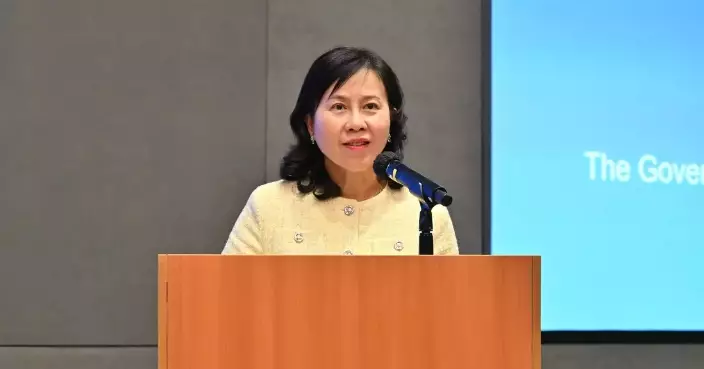
Hong Kong Launches Scheme to Attract Guangdong Tourists for Holiday Spending

FEHD Launches Blitz on Unlicensed Hawkers, Arrests 41 and Seizes 350kg of Unsafe Food

MyRepublic Launches Card Sub, Singapore’s First Subscription Service for Trading Card Game Fans

HARMAN to Acquire ZF’s ADAS Business

Swedish Businesses Shift from AI Curiosity to Action, Says Dstny Sweden

allnex wins EU Product Safety Award for PFAS-Free additives

Arctic security remains key priority for EU: European Commission President

Independent Committee Inspects Wang Fuk Court Fire Site to Investigate Causes and Safety Measures

Shanghai launches Fuxing Island as global maker hub
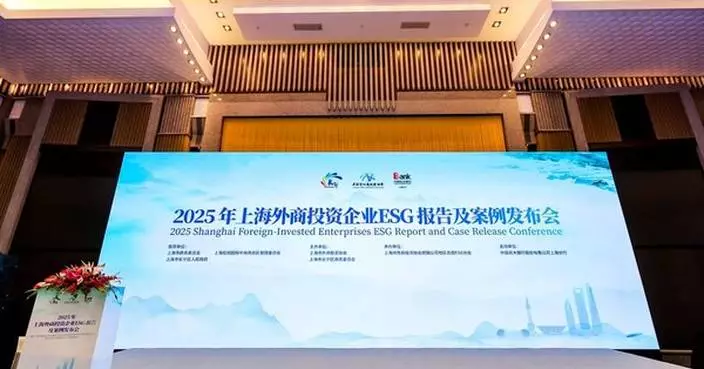
Shanghai-based MNCs step up ESG innovation

Rao Tummala and Industry Leaders from ASE, TSMC, Intel, Toyota, and Honda to Speak at NEPCON JAPAN's 40th Anniversary

HTX Trading Championship Concludes, Attracting Over 90,000 Participants and Distributing 1,000,000 USDT in Rewards

Team official to investigate drinking habits of England cricketers during Ashes tour
IOC president congratulates CMG for completing filming of special sports program

Bracell Wins 2025 Amcham Eco Award for Pioneering One-for-One Environmental Conservation Initiative

Nigerians welcome 130 schoolchildren and teachers released after mass abduction
Heavy snow sweeps northern China
China's key regions post noticeable foreign trade growth from January to November

HK Museum of Art Launches Three New Exhibitions, Featuring Wu Guanzhong's Works and Unique Chinese Art Collections

Draymond Green, Steve Kerr have heated exchange in huddle during timeout before Green leaves court
Japan's attempt to possess nuclear weapons could lead itself into war: historical researcher

Duren scores 26 and Pistons beat Trail Blazers 110-102 after blowing 21-point lead

Over 4 Million Users Registered on 'iAM Smart' Digital Services Platform, Enhancing Government Service Accessibility

South Korea lawmakers pass bill to establish rebellion courts after complaints about Yoon case

Japan's former emperor turns 92 as heart condition stabilizes after health concerns

Nine Years of Impact: JULO Disburses USD 1.7 Billion in Digital Financing Across Indonesia

WEMADE Partners with Razer to Power Esports Tournament, YMIR Cup World Championship

Henderson Land Bestowed Asia’s Most Sustainable Company of the Year 2025

Jordan Eberle scores 2 in 3rd period as Kraken beat Ducks 3-1

Philip Rivers starts strong, but his late Pick-6 proves costly to Colts' playoff hopes in 48-27 loss

At least 5 killed after Mexican Navy plane on medical mission crashes in Texas

/C O R R E C T I O N -- Musee Platinum Tokyo/

Mason Marchment scores 2 power-play goals, Kirill Marchenko adds 1 as Blue Jackets beat Kings 3-1

Brock Purdy throws career high 5 TD passes and leads 49ers to 5th straight win, 48-27 over the Colts

Stephen Curry's big second half carries Warriors past Magic 120-97
First flight of international tourists arrive in Hainan under seventh-freedom traffic right

Fox ESS Signs Olympic Champion Ian Thorpe as Australian Brand Ambassador

Powerball jackpot soars to $1.7 billion after another night with no big winner

Gilgeous-Alexander scores 31, Thunder rebound from 2 losses in 3 games to beat Grizzlies 119-103

Comera Financial Holdings, Part of Abu Dhabi’s Royal Group, and SC Ventures Announce Strategic Collaboration to Explore Innovation in SME and Beyond

Swanson TV dinners and Tang: How well do you know baby boomer pop culture?

From hula hoops to hearing aids: Oldest baby boomers turn 80 in 2026, contributing to an aging US

The Bills, Jaguars and Chargers are headed to the playoffs after the Colts' 5th straight loss

Nuggets jump out to a 19-0 lead and rout the Jazz 135-112

Betty Reid Soskin, oldest National Park Service ranger, dies at 104

Maison&Objet Intérieurs Hong Kong 2025 Successfully Concludes Second Edition

Queensland Supreme Court Rules in Favour of BUMA Australia in Contract Mining Agreement Dispute

Pacers coach Rick Carlisle wants league to review play that injured Isaiah Jackson

Burries scores 20 points, No. 1 Arizona runs away from Bethune-Cookman for 107-71 win
Gold, silver prices soar to new record highs as investors hunt for safety

Thailand and Cambodia to resume ceasefire talks after deadly border clashes

HICC Pet × Marina One - Mental Wellness Month: Healing Moments with Dogs at HICC Pet Showroom

US strikes another alleged drug-smuggling boat in eastern Pacific

Vince Zampella, video game pioneer behind Call of Duty, dies at 55

New Mercury Control Ordinance Takes Effect December 2025, Banning Harmful Products to Protect Public Health

Zion Williamson scores 24 to lead Pelicans over Mavericks for 5th straight win

Trump warns Maduro against playing 'tough' as US escalates pressure campaign on Venezuela

Grebenkin, Grundstrom lead Flyers to 5-2 win over Canucks
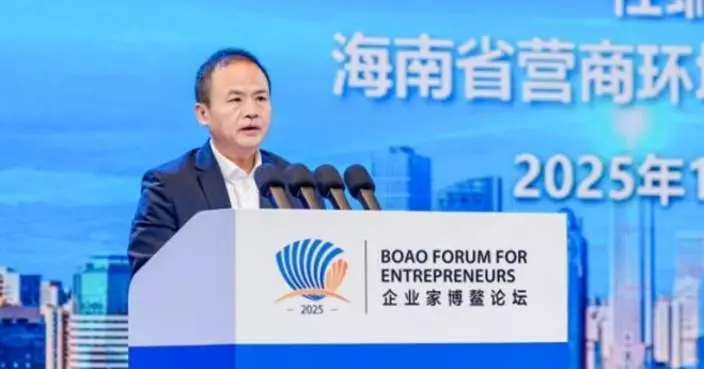
Xinhua Silk Road: Hainan FTP vows to further optimize business environment

Top photos from Week 16 of the NFL season

Rescuing Meals, Rewriting Waste: Yindii Closes 2025 With Over Half a Million Meals Saved

Yindii Turns Food Waste Into Value, Saving 500,000+ Meals in 2025

Agoda Insights Reveal Business Impact of Localization Across Asia's Rapidly Growing Tourism Sector

Jaylen Brown scores 31 points as Celtics rally past Pacers 103-95
Chinese yuan strengthens to 7.0523 against USD Tuesday

Hualien New Year's Countdown Party Kicks Off Taiwan's Year-End Festivities and Winter Travel Season

Judiciary Expands E-Appointment Services for Distress Warrants Starting December 30
Crude futures settle higher

Mitchell scores 30 points as the Cavaliers beat the Hornets 139-132 to end a 3-game losing streak
U.S. dollar ticks down
U.S. stocks close higher

MILLENNIUM HOTELS & RESORTS AND IHCL JOIN HANDS ON A GLOBAL LOYALTY PARTNERSHIP

Raddysh has goal, 2 assists to reach 100 career points as Lightning beat Blues 4-1
2026 Spring Festival Gala mascots displayed on outdoor screens across China

Changzhou Invites the Public to Explore the City Through Culture

Discovering Lianyungang: A City Shaped by Mountains and Sea

Zenith Yacht Charters Expands Into Yacht Brokerage With New Platform Zenith Yachting Asia

Takeaways from AP's report on a beef plant closure that threatens to unravel a small Nebraska town

An American Dream at risk: What happens to a small Nebraska town when 3,200 workers lose their jobs
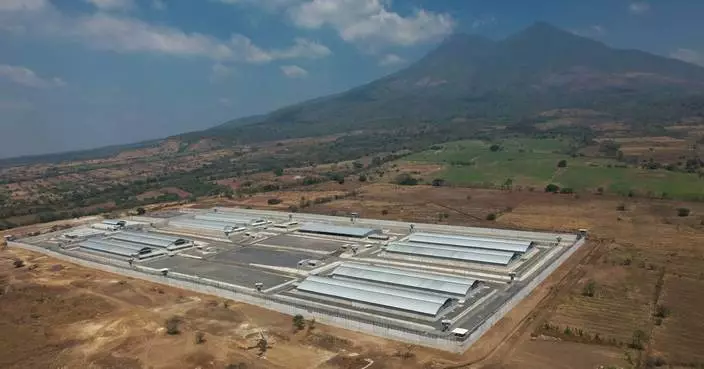
Judge rules Trump administration must allow court challenges for Venezuelan migrants sent to prison
















